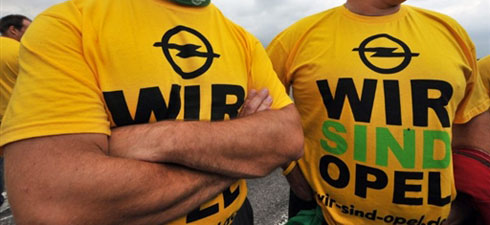The new German government is off to a very bad start, notes*Süddeutsche Zeitung*. Leading with the headline "In-Flight Horror!" the Munich daily explains that the freshly re-elected Chancellor Angela Merkel, who learned of the news on her way home from making a speech to Congress in Washington, has been made to look ridiculous along with her government. Tageszeitung reminds readers that Mrs Merkel did all she could to exploit the question of the future of Opel in her election recent election campaign, which encouraged "the supposedly open-minded citizens of Germany to indulge in an unashamed display of jingoistic self interest." The effort to save the troubled carmaker was presented as an epic conflict against "evil American turbo-capitalists," and "smarmy Italians, who had a greedy eye on German subsidies." The position with regard to Opel factories in other European countries was quite simple: "We don't give a damn; German jobs are all that counts." Frankfurter Allgemeine Zeitungfurther highlightswhat it sees as the folly of "the failed attempt to politicize" the GM-Magna agreement, by a Chancellor who stubbornly insisted on interfering in the market economy.
Other European countries were also shocked by the news. Leading with the headline "America takes Europe by surprise," *La Tribunenotes that it is almost unheard of for a corporate decision to trigger "such a welter of political and diplomatic comment" from so many governments — in cities as far removed as Moscow, Berlin, Brussels and Madrid. The main fear, as the French business daily notes, is the spectre of mass layoffs, which has led to a breaking of ranks within the EU. As La Vanguardia remarks, "Washington's unflinching strategic determination to prevent the German operation from going ahead is in stark contrast to the disorder that reigns in Europe, where every country remains solely focused on its own interest, and demonstrates a complete disdain for any supranational concerns." ForLa Tribune "the strong reaction in Europe" has in part been prompted "by the nightmare memory of Vilvoorde, Belgium, where the closure of a large Renault plant in 1997" resulted in the loss of 3,000 jobs, and it is the prospect of job losses that leads [La Libre Belgique*](http://www.lalibre.be/economie/actualite/article/540723/l-epouvantail-gm.html "La Libre Belgique predicts")to predict that a "popular campaign against GM will take shape on the Old Continent" with major demonstrations in countries where Opel factories are located. The daily is convinced that "Flanders will also take part in this combat — whose outcome is by no means certain— to defend the interests of the factory in Antwerp," where 600 jobs are now under threat.
Good for Europe's car industry?
In the columns ofDe Morgen, car industry analyst Vic Heylen takes the view that GM's U-turn was mainly prompted by concerns over its share of the Russian market, which the Americans want to keep for themselves: "GM could not allow itself to leave this market to the Magna-Sberbank consortium, which had made Russia the cornerstone of its business plan." The Spanish press appears more optimistic: the Opel factory in Figueruelas near Saragossa probably has little to fear, notesPúblico, which further adds that "the plant is well positioned to withstand the inevitable restructuring of Opel's factories in Europe." In an interview with the daily, Enrico Digirolamo, Vice-President of GM in Europe, insists that the plant "will play a key role" in GM's future European strategy. In Italy, La Stamparemarks on the timing of GM's announcement, which coincided with the relaunch of its competitor Chrysler, bought by Fiat earlier this year. The daily, which is owned by the Italian carmaker whose offer for Opel was summarily rejected by Berlin, savours what it views as poetic justice and avers that "GM did well to keep control of Opel."
The Financial Times believes that "GM’s decision is good for Europe’s car industry." According to the London business daily, "The imperative efficiently to dismantle Europe’s overcapacity in car manufacturing is one that Germany has long been doing all it can to frustrate," and for which, "the global crisis should have been the catalyst for accelerating much-needed structural change". "This stitch-up (between GM and Berlin) defied commercial logic: the Belgian investment group RHJ, which GM at one point preferred, offered to make do with €3.2bn. But Magna seemed more pliant to German wishes that job cuts disproportionately happen elsewhere in Europe. This costly employment protection flagrantly breached the spirit of the European single market." With this in mind, Handelsblattinsists that "politicians and unions should not erect any further insuperable obstacles to hinder the turnaround of Opel". Similarly, *Rzeczpospolita*takes the view that "normality has now been restored: even if Opel goes bankrupt, at least it will be the fault of the market, and not the result of a political failure."
Was this article useful? If so we are delighted!
It is freely available because we believe that the right to free and independent information is essential for democracy. But this right is not guaranteed forever, and independence comes at a cost. We need your support in order to continue publishing independent, multilingual news for all Europeans.
Discover our subscription offers and their exclusive benefits and become a member of our community now!












